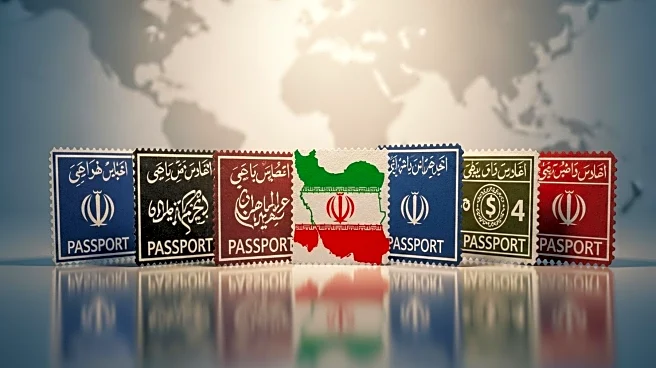What's Happening?
The United States is set to deport 120 Iranians back to Iran over the next two days, according to reports from Iran's state-affiliated media. This development follows a rare agreement between the U.S. and Iranian governments, despite the absence of formal diplomatic ties. The deportees, many of whom reportedly entered the U.S. illegally through Mexico, will be flown to Iran via Qatar. Hossein Noushabadi, the head of consular affairs at Iran's foreign ministry, confirmed the deportation plans and emphasized that the individuals left Iran legally, thus facing no obstacles upon their return. The Iranian government has requested that the U.S. respect the rights of Iranian immigrants during this process. This move aligns with President Trump's focus on curbing illegal immigration, while also highlighting the complex relationship between the two nations, particularly in light of Iran's ongoing economic challenges and international sanctions.
Why It's Important?
The deportation of these individuals underscores the ongoing tensions between the U.S. and Iran, particularly in the realm of immigration and international diplomacy. For the U.S., this action is part of a broader strategy to address illegal immigration, a key priority for President Trump's administration. For Iran, the return of its citizens comes at a time of economic hardship, exacerbated by international sanctions related to its nuclear program. The deportation could have significant implications for the individuals involved, many of whom may face uncertain futures upon their return to Iran. Additionally, this development may influence U.S.-Iran relations, potentially affecting future negotiations or diplomatic engagements. The situation also raises questions about the treatment and rights of immigrants, a topic of ongoing debate in U.S. domestic policy.
What's Next?
The immediate next step involves the logistical execution of the deportation, with the first group expected to arrive in Iran shortly. The Iranian government may continue to monitor the situation closely, particularly in terms of how its citizens are treated during the deportation process. On a broader scale, this event could prompt further discussions or actions from both governments regarding immigration policies and bilateral relations. It remains to be seen how this development will impact future diplomatic interactions between the U.S. and Iran, especially in the context of ongoing geopolitical tensions.











